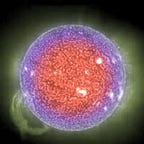1. The Subjunctive Reality Hypothesis
Even if nothing existed, it seems like we should still be able to make some true statements. To steal some words from the philosophers, “necessary” truths ought to still be true, even in the perverse case where nothing actually exists.
For example, we ought to be able to say that the answer to the question “what’s 1+1?” would remain “2”, even if nothing existed. Well, but maybe the concept of numbers and math don’t even exist. So we’ll have to define them in order to even ask the question. We’ll have to say something like, “What if we use this decimal counting system and this addition operation, and we fed it the numbers 1 and 1, then what would the result be?” In fact, we shouldn’t rely on language itself existing, so we’ll need to be even more explicit and define the language, but I’ll let you imagine that tiny technicality for now. In any case, it seems like we should be able to construct such a sentence, and if we do, it should have a correct answer. Even if nothing actually exists.
So the basic hypothesis is this: the things that would “exist” even when nothing else exists are the sorts of things you can phrase as a “well-formed what-if” question, because you have to have a bunch of definitional “what-if” clauses before asking the thing you’re interested in. Hence the “subjunctive” in the name, after the part of speech.
Now we need to talk about what counts as a well-formed what-if question. There’s two basic failure modes. You could under-specify the question, and then it has no unique answer, for example “What if an animal with fur existed, would it have a duck bill?” Or you could over-specify your question and exclude all possible answers, as in “How many corners does a square circle have?”
One way to be really sure that your question has an answer (i.e., is well formed) is to phrase it in the form of a computer program. “What if I run this program under this model of computation?” That’s not to say you’d get an answer that you like (or even expect) but if you phrase a question like this you can leverage all the work that went into designing the model of computation (computer scientists are really into getting their computations to behave consistently), and be really sure that at least the question is well-formed.
What if the program takes a really long time to run? Not a big deal. We may not be able to run slow programs personally, due to the eventual heat death of the universe. But that doesn’t trouble us in the platonic realm of what-if questions. We can run programs that are pretty large and run for trillions of cycles in minutes on our pocket phones. If you trust mathematical induction, then we can be confident it’ll continue to work up to arbitrarily large program run times.
What if the program goes into an infinite loop and never writes any output? Or what if the program has a bug and stops early? This is like accidentally asking one question when you intended to ask another one. Here we enter the realm of wanting to prove various facts about the output of programs, and this is easy or difficult, depending on what you want to prove.
What if the question you want to ask can’t be translated into a computable program? That turns out to be a very interesting question, which deserves its own post. For now, please note that my claim is that computable things do exist, not that uncomputable things don’t exist.
OK. So given this hypothesis, it’s probably not immediately clear how it explains anything, let alone the universe we live in or everyday life. Next up in this series we will do some review so we have some tools to think about what computable things look like, and whether this can explain reality as we experience it.
P.S. You may have heard of the Mathematical Universe Hypothesis (MUH) or “Tegmark IV”, and if so you may be wondering what the difference is between that and my Subjunctive Reality Hypothesis. Primarily, the difference is framing: I show how it is that we get from nothing to mathematical structures (they have the well-formed question property). Secondarily, my focus is going to be on the computable subset of the mathematical universe, and I’m going to attempt to make an actual prediction. I waffle about the uncomputable universes, but I think I’ll have something to say about them, too, when we get there.
